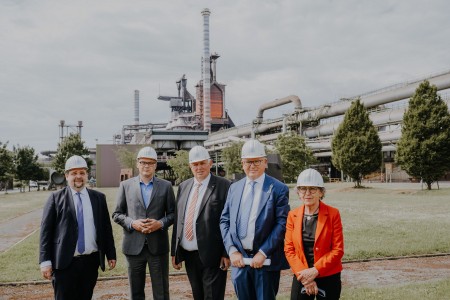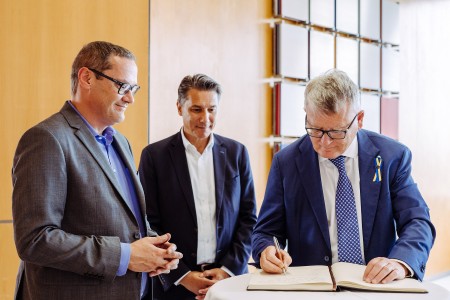Daily press, 2022-05-23, 03:10 pm
Promoting investment in the transformation: safeguarding value creation and employment. thyssenkrupp makes the case for a fair restructuring of EU emissions trading during a visit by EU Commissioner Schmit
Duisburg, 23.05. Nicolas Schmit, EU Commissioner for Employment and Social Rights, today learned about thyssenkrupp's plans for climate-neutral steel production. He was accompanied by NRW's Minister of Labor and Social Affairs Karl-Josef Laumann and Dennis Radtke, Member of the European Parliament for the Ruhr region. Markus Grolms, Executive Board Member for Human Resources at thyssenkrupp Steel, and Tekin Nasikkol, Chairman of the General Works Council of the Duisburg steel company, welcomed the guests and, during a plant tour, explained the dimensions and employment-related challenges of the transformation.
Markus Grolms took this opportunity to express the steel industry's great concern that an overly ambitious redesign of the European emissions trading system would achieve precisely the opposite of the actual objective: "We want a climate-neutral European industry and we intend to achieve the climate targets. thyssenkrupp Steel alone plans to invest around seven billion euros in transforming Europe's biggest steel site – with hydrogen-based production processes. This would also make us the largest European consumer of hydrogen. Our transformation project has the potential to give a massive boost to building a hydrogen economy. However, if the burdens from European emissions trading increase drastically and in the billions from 2026 onwards, we will be deprived of the means to invest. We can only spend the money once. This would massively jeopardize the start of the transformation, and value creation, employment and social security would be at risk. We therefore propose that companies with a proven track record of investing in the transformation should be exempt from the planned reduction in free allocations by 2030. We strongly advocate that Germany's national and regional governments lobby Brussels for an economically fair solution that serves climate goals."
Tekin Nasikkol added: "We are looking at the biggest rebuild of our plant since its inception. Our goal is to make this transformation as employment-neutral as possible. New job profiles and new qualifications are also needed to cope with this. This requires long-term planning, which we have already begun. In the long term, the transformation can have a lasting impact on qualification. All this must not be jeopardized by a reorganization of emissions trading that overshoots the mark. The European Parliament must respect the interests of employees when making its decision and put a sustainable solution in place."
The European Parliament will vote on 7/8 June on the Commission's proposals for continuing European emissions trading from 2026 onward. Most recently, the Parliament's Environment Committee tightened up the Commission's proposal. On this basis, the free allocations granted to date under emissions trading would be reduced and eventually eliminated by 2030.
Dennis Radtke: "We must not ignore the industrial policy dimensions of the transformation. Europe lives from its strong industrial base. We want to make this strong foundation for employment and social security climate-neutral. However, this can only be achieved if we support companies that show responsibility and set out on their journey despite the fact that the framework conditions are still not in place. A just transition means not forgetting the people affected by the change. My urgent request to EU Commissioner Schmit is therefore to work to find a solution to emissions trading that promotes investment and safeguards jobs."
Captions
Image 1:
Fair restructuring of EU emissions trading essential for the transformation of the steel industry: EU Commissioner for Employment and Social Rights Nicolas Schmit (2nd from right), North Rhine-Westphalia Labor and Social Affairs Minister Karl-Josef Laumann (m.) and Dennis Radtke, Member of the European Parliament for the Ruhr region (l.) talk with Markus Grolms (2nd from left), Chief Human Resources Officer of thyssenkrupp Steel, during their visit to the steel company thyssenkrupp Steel in Duisburg about the employment challenges of the transformation and the steel industry's concern that an overly ambitious redesign of the European emissions trading system would not achieve the actual goal of a climate-neutral European industry and the climate targets themselves. Edeltraud Klabuhn (r.), 1st Mayor of the City of Duisburg.
Image2:
Signing thyssenkrupp Steel's golden book: EU Commissioner for Employment and Social Rights Nicolas Schmit (r.) is welcomed by Markus Grolms (l.), Executive Board Member for Human Resources at thyssenkrupp Steel, and Tekin Nasikkol (m.), Chairman of the General Works Council of the Duisburg steel company, for an exchange on climate-neutral steel production, long-term job security and European emissions trading.





